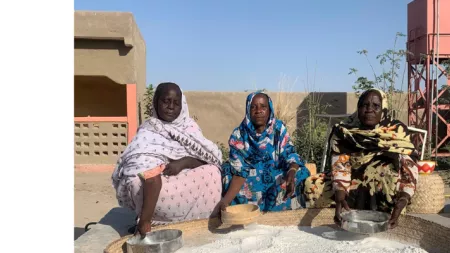It has been a little less than a year since the Employment, Resilience and Social Cohesion Project in the Sahelian strip and the Lake Chad area funded by the European Union, ended. Set up in the Lac province, Chad and targeting more than 2,000 participants, it has supported job creation and the autonomy of the inhabitants of the province region.
The project has created, among other things, a women's cooperative providing it with premises for the processing and marketing of local products and food.
Today, without the help of donors, a dozen women continue to go to work every day. In this cooperative, the women make provisions, various cakes and jams, which they sell to the inhabitants of the locality of NGouri, and also many vegetable and fruit juices as well as daily meals.
Here, the inhabitants of this locality, especially the men who spend their day at work, come to eat, as at home.
Meals, based on maize, peanuts, millet and sorghum, have all the nutrients to fight against food insecurity and their sale allows the women who work in the cooperative to live better in this part of Chad. For Achta Abdoulaye, 45, work now allows her to send her children to school.
Thanks to my work at the cooperative, I earn 1500 FCA per day (about 3 USD). This allows me to have more food for me and my family; for the beginning of the 21-22 school year I was able to buy school supplies for my children.Achta Abdoulaye, 45, cooperative member
This mother of six children, four of whom are in school, adds: “I would have liked to go to school, my life would have been different. I want my children to go to school because they will have a better future than mine.”
Falmata-El is 35 years old, she is a widow and she has a sick son, aged 12. When she is not working at the cooperative, she makes a living from petty trade, notably selling sesame at the market to earn a little more money and take care of her son.
To fight child malnutrition, the women also prepare enriched porridge, which they sell to mothers. The porridge is prepared with beans, rice, peanuts, millet, sorghum, sugar and salt.
More than the financial income, the cooperative allows women to build links, to support each other in case of need and to create friendships. “Here we support each other. We talk about our problems and we try to find solutions together,” says Falmata-El. This project has also changed habits, in particular allowing women to go out of their homes regularly and have a job.
